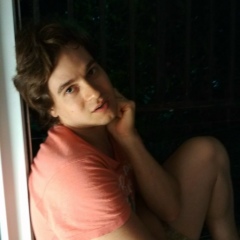Почему геи любят Бузову???
(количество вопросительных знаков соответствует моему удивлению (тому что ее вообще кто-то любит))
Идея такая. В российском коллективном мозге есть два больших образа: МУЖСКОЙ и ЖЕНСКИЙ. И больше не особо (вообще их конечно больше: есть и тетеньки которые считают себя дяденьками но при этом любят тех же дяденек (то есть казалось бы в чем проблема ваще алЁ) но нет это проблема; есть трансгендеры, есть и просто люди которым не очень важно с кем и что), но сейчас я говорю не про практику, а про риторику. Про практику ниже. Какие еще есть примеры ДВУХ КОМПЛЕКСНЫХ допустим образов без особого выбора кроме: в Америке или ты в республиканской, или в демократической партии (ну чтобы чего-то достичь). Крестик и рясу ты не можешь принять без всего остального христианства (некорректный пример, конечно, тут уместнее наверное говорить о каких-то более идеологических моментах, но идея та же). Еще у меня был какой-то пример, но я его забыл.
Так вот Бузова, точнее, геи. МУЖЧИНА он такой, такой и такой, а не другой, другой и другой. В смысле что он обладает в риторике, в _норме_ определенными качествами, а не другими. Ну и ЖЕНЩИНА тоже. Теперь наконец геи: в образе МУЖЧИНЫ тесно (по опыту говорю, ну и предполагаю у других). Куда идти куда податься? В образ ЖЕНЩИНЫ.
А теперь Бузова. О чем песня? О тяжелой судьбе русской женщины. А да, я говорю про "Мало мало половин". "Ты был господином моего мира" — позиция жертвы. Я сам из этой истории и (конечно может у меня фантазии, но если вы дочитали до этого места то вам как минимум было любопытно если конечно вы не агент фсб) наблюдаю ее у такого большого количества моих знакомых и незнакомых. Короче. Что нового несет нам популярная российская артистка в своем произведении? Она заявляет о своем выходе из этой позиции. Половин мало, открывает мир других мужчин — значит заявляет о своем праве выбирать самой партнеров. Я думаю это очень импонирует гомосексуалам (предполагаю, ну и мне собственно тоже это близко), потому что и образ ЖЕНЩИНЫ-то тоже тесный.
Теперь о практике. Почему такая популярность? Почему именно сейчас? Вот допустим она спела это в XVI веке — ну сожгли, ведьмой больше ведьмой меньше всем пох. В 1950-е? Из партии исключили и тоже (подозреваю) без ответной реакции равнодушной публики. А сейчас почему? Отвечаю: потому что практика уже изменилась, и сознание уже изменилось, а риторика нет. И вот она изменяет эту риторику. Фиг бы она справилась с изменением сознания или практики (а вообще это могут сделать усилия одного человека?). А вот риторику, тем более в доступной форме, можно.
Есть вопрос, а вообще кто-то это осознает? Ведь мало кто прислушивается к словам. Вот что у меня есть сообщить по этому поводу. У меня у самого есть такая штука, что я вдруг начинаю напевать что-то, напеваю и напеваю и иногда удивляюсь, с чего бы это, ну потому что бывает совсем ерунда какая-то. Потом (уже научился это делать осознанно) вдумываюсь в слова и оказывается, что они выражают ровно то что сейчас во мне творится! Объяснений у меня этому нет, но работает ровно так же если бы я и не осознавал. Функция это песен или критерий их успешности я не знаю, но вот режиссер Ален Рене снял целый фильм с участием этого механизма. http://www.imdb.com/title/tt0119828/
Я ответил на свой вопрос?
(количество вопросительных знаков соответствует моему удивлению (тому что ее вообще кто-то любит))
Идея такая. В российском коллективном мозге есть два больших образа: МУЖСКОЙ и ЖЕНСКИЙ. И больше не особо (вообще их конечно больше: есть и тетеньки которые считают себя дяденьками но при этом любят тех же дяденек (то есть казалось бы в чем проблема ваще алЁ) но нет это проблема; есть трансгендеры, есть и просто люди которым не очень важно с кем и что), но сейчас я говорю не про практику, а про риторику. Про практику ниже. Какие еще есть примеры ДВУХ КОМПЛЕКСНЫХ допустим образов без особого выбора кроме: в Америке или ты в республиканской, или в демократической партии (ну чтобы чего-то достичь). Крестик и рясу ты не можешь принять без всего остального христианства (некорректный пример, конечно, тут уместнее наверное говорить о каких-то более идеологических моментах, но идея та же). Еще у меня был какой-то пример, но я его забыл.
Так вот Бузова, точнее, геи. МУЖЧИНА он такой, такой и такой, а не другой, другой и другой. В смысле что он обладает в риторике, в _норме_ определенными качествами, а не другими. Ну и ЖЕНЩИНА тоже. Теперь наконец геи: в образе МУЖЧИНЫ тесно (по опыту говорю, ну и предполагаю у других). Куда идти куда податься? В образ ЖЕНЩИНЫ.
А теперь Бузова. О чем песня? О тяжелой судьбе русской женщины. А да, я говорю про "Мало мало половин". "Ты был господином моего мира" — позиция жертвы. Я сам из этой истории и (конечно может у меня фантазии, но если вы дочитали до этого места то вам как минимум было любопытно если конечно вы не агент фсб) наблюдаю ее у такого большого количества моих знакомых и незнакомых. Короче. Что нового несет нам популярная российская артистка в своем произведении? Она заявляет о своем выходе из этой позиции. Половин мало, открывает мир других мужчин — значит заявляет о своем праве выбирать самой партнеров. Я думаю это очень импонирует гомосексуалам (предполагаю, ну и мне собственно тоже это близко), потому что и образ ЖЕНЩИНЫ-то тоже тесный.
Теперь о практике. Почему такая популярность? Почему именно сейчас? Вот допустим она спела это в XVI веке — ну сожгли, ведьмой больше ведьмой меньше всем пох. В 1950-е? Из партии исключили и тоже (подозреваю) без ответной реакции равнодушной публики. А сейчас почему? Отвечаю: потому что практика уже изменилась, и сознание уже изменилось, а риторика нет. И вот она изменяет эту риторику. Фиг бы она справилась с изменением сознания или практики (а вообще это могут сделать усилия одного человека?). А вот риторику, тем более в доступной форме, можно.
Есть вопрос, а вообще кто-то это осознает? Ведь мало кто прислушивается к словам. Вот что у меня есть сообщить по этому поводу. У меня у самого есть такая штука, что я вдруг начинаю напевать что-то, напеваю и напеваю и иногда удивляюсь, с чего бы это, ну потому что бывает совсем ерунда какая-то. Потом (уже научился это делать осознанно) вдумываюсь в слова и оказывается, что они выражают ровно то что сейчас во мне творится! Объяснений у меня этому нет, но работает ровно так же если бы я и не осознавал. Функция это песен или критерий их успешности я не знаю, но вот режиссер Ален Рене снял целый фильм с участием этого механизма. http://www.imdb.com/title/tt0119828/
Я ответил на свой вопрос?
Why do gays like Buzov ???
(the number of question marks corresponds to my surprise (the fact that someone loves her at all))
The idea is this. In the Russian collective brain there are two large images: MALE and FEMALE. And no longer really (in general, there are more of them: there are also aunts who consider themselves uncles but at the same time love the same uncles (that is, it would seem that the problem is finally possible), but this is not the problem; there are transgender people, there are just people who don’t it is important with whom and what), but now I'm not talking about practice, but about rhetoric. Pro practice below. What else are examples of TWO COMPLEX Let us admit images with no particular choice except: in America or you are in the Republican or in the Democratic Party (well, to achieve something). You can’t accept the cross and robe without the rest of Christianity (an incorrect example, of course, is probably more appropriate to talk about some more ideological points, but the idea is the same). I also had an example, but I forgot it.
So Buzova, more precisely, gay. A man he such, such and such, and not the other, the other and the other. In the sense that he possesses in rhetoric, in _norm_ certain qualities, and not others. Well, WOMAN too. Now finally gay: in the image of a man closely (from experience I say, well, I guess others). Where to go where to go? In the image of a woman.
And now Buzova. What is the song about? On the difficult fate of Russian women. And yes, I'm talking about "Not enough half." "You were the master of my world" - the position of the victim. I myself am from this story and (of course I may have fantasies, but if you have read this far, then you are at least curious if you are certainly not an agent of the FSB) I observe it from so many of my friends and strangers. In short. What's new for us is the popular Russian artist in her work? She declares her exit from this position. Half is not enough, the world of other men opens up - it means that it declares its right to choose its partners. I think this is very appealing to homosexuals (I suppose, well, to me, actually, it’s also close), because the image of a WOMAN is also close.
Now about the practice. Why so popular? Why now? Let's say she sang it in the XVI century - well, they burned it, the witch is more like a witch, less everyone else. In the 1950s? I also excluded from the party (I suspect) without the indifferent public responding. Why now? I answer: because the practice has already changed, and the consciousness has already changed, but the rhetoric does not. And so she changes this rhetoric. FIG she would cope with a change in consciousness or practice (and in general it can make the efforts of one person?). But rhetoric, especially in an accessible form, is possible.
There is a question, but in general, does anyone realize this? After all, few people listen to the words. Here is what I have to report on this. I myself have such a thing that I suddenly begin to hum something, sing and sing and sometimes wonder why it is, well, because there is some kind of nonsense. Then (I have already learned to do this consciously) I think about the words and it turns out that they express exactly what is happening in me now! I have no explanation for this, but it works exactly the same if I had not been aware. The function is the songs or the criterion of their success, I do not know, but the director Alain Rene made a whole film with the participation of this mechanism. http://www.imdb.com/title/tt0119828/
I answered my question?
(the number of question marks corresponds to my surprise (the fact that someone loves her at all))
The idea is this. In the Russian collective brain there are two large images: MALE and FEMALE. And no longer really (in general, there are more of them: there are also aunts who consider themselves uncles but at the same time love the same uncles (that is, it would seem that the problem is finally possible), but this is not the problem; there are transgender people, there are just people who don’t it is important with whom and what), but now I'm not talking about practice, but about rhetoric. Pro practice below. What else are examples of TWO COMPLEX Let us admit images with no particular choice except: in America or you are in the Republican or in the Democratic Party (well, to achieve something). You can’t accept the cross and robe without the rest of Christianity (an incorrect example, of course, is probably more appropriate to talk about some more ideological points, but the idea is the same). I also had an example, but I forgot it.
So Buzova, more precisely, gay. A man he such, such and such, and not the other, the other and the other. In the sense that he possesses in rhetoric, in _norm_ certain qualities, and not others. Well, WOMAN too. Now finally gay: in the image of a man closely (from experience I say, well, I guess others). Where to go where to go? In the image of a woman.
And now Buzova. What is the song about? On the difficult fate of Russian women. And yes, I'm talking about "Not enough half." "You were the master of my world" - the position of the victim. I myself am from this story and (of course I may have fantasies, but if you have read this far, then you are at least curious if you are certainly not an agent of the FSB) I observe it from so many of my friends and strangers. In short. What's new for us is the popular Russian artist in her work? She declares her exit from this position. Half is not enough, the world of other men opens up - it means that it declares its right to choose its partners. I think this is very appealing to homosexuals (I suppose, well, to me, actually, it’s also close), because the image of a WOMAN is also close.
Now about the practice. Why so popular? Why now? Let's say she sang it in the XVI century - well, they burned it, the witch is more like a witch, less everyone else. In the 1950s? I also excluded from the party (I suspect) without the indifferent public responding. Why now? I answer: because the practice has already changed, and the consciousness has already changed, but the rhetoric does not. And so she changes this rhetoric. FIG she would cope with a change in consciousness or practice (and in general it can make the efforts of one person?). But rhetoric, especially in an accessible form, is possible.
There is a question, but in general, does anyone realize this? After all, few people listen to the words. Here is what I have to report on this. I myself have such a thing that I suddenly begin to hum something, sing and sing and sometimes wonder why it is, well, because there is some kind of nonsense. Then (I have already learned to do this consciously) I think about the words and it turns out that they express exactly what is happening in me now! I have no explanation for this, but it works exactly the same if I had not been aware. The function is the songs or the criterion of their success, I do not know, but the director Alain Rene made a whole film with the participation of this mechanism. http://www.imdb.com/title/tt0119828/
I answered my question?
У записи 15 лайков,
4 репостов,
4947 просмотров.
4 репостов,
4947 просмотров.
Эту запись оставил(а) на своей стене Михаил Жаботинский


































